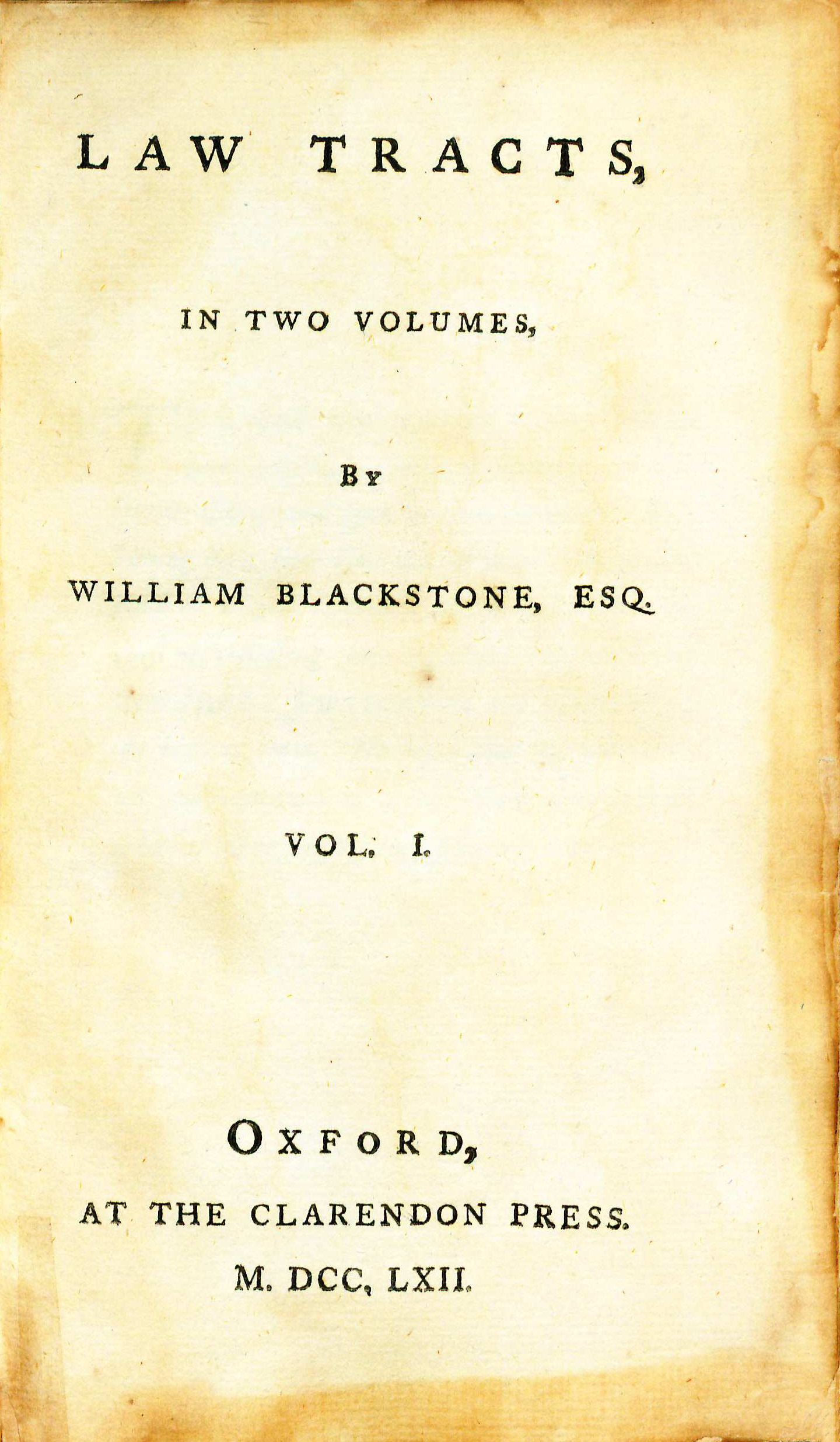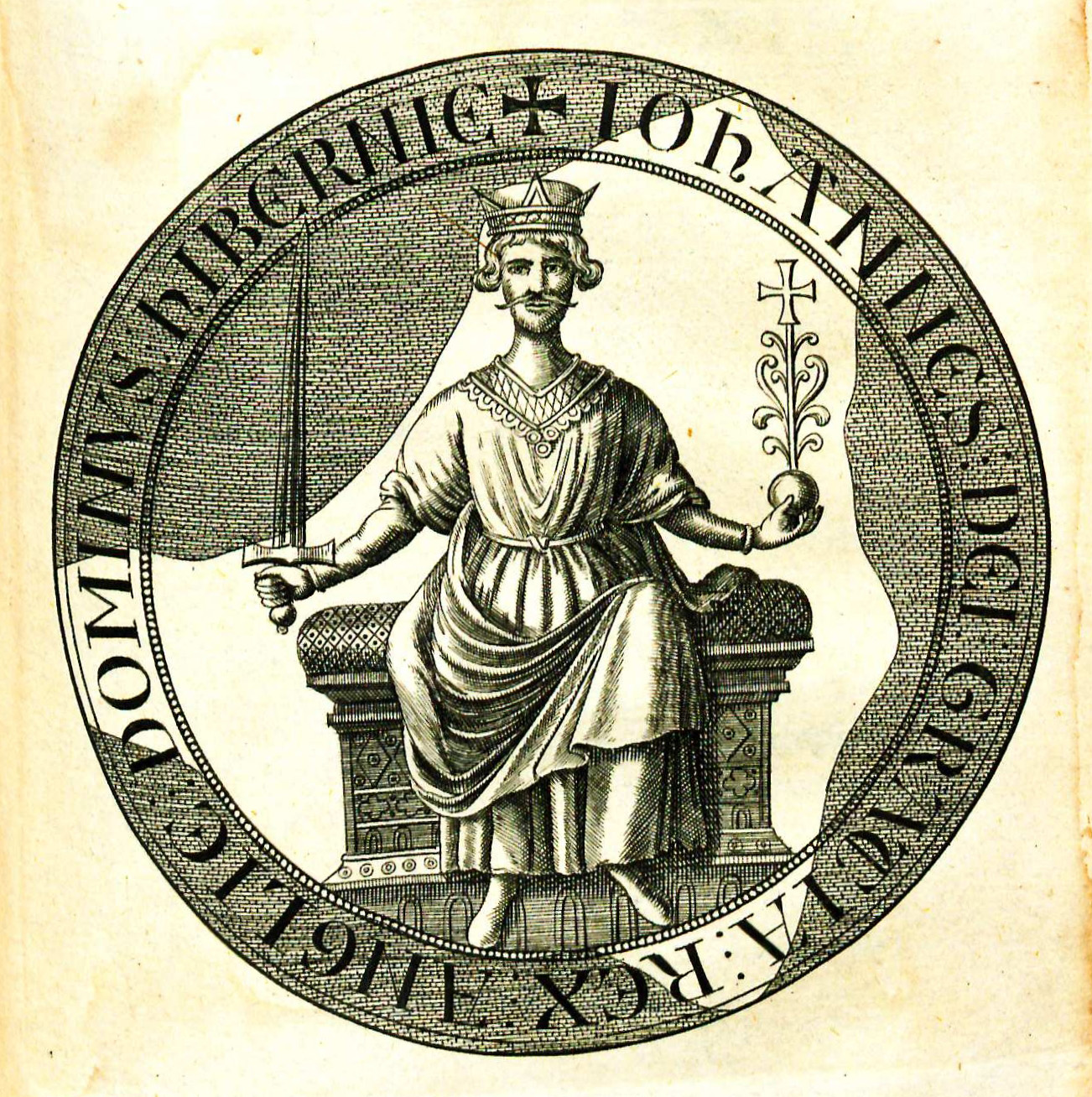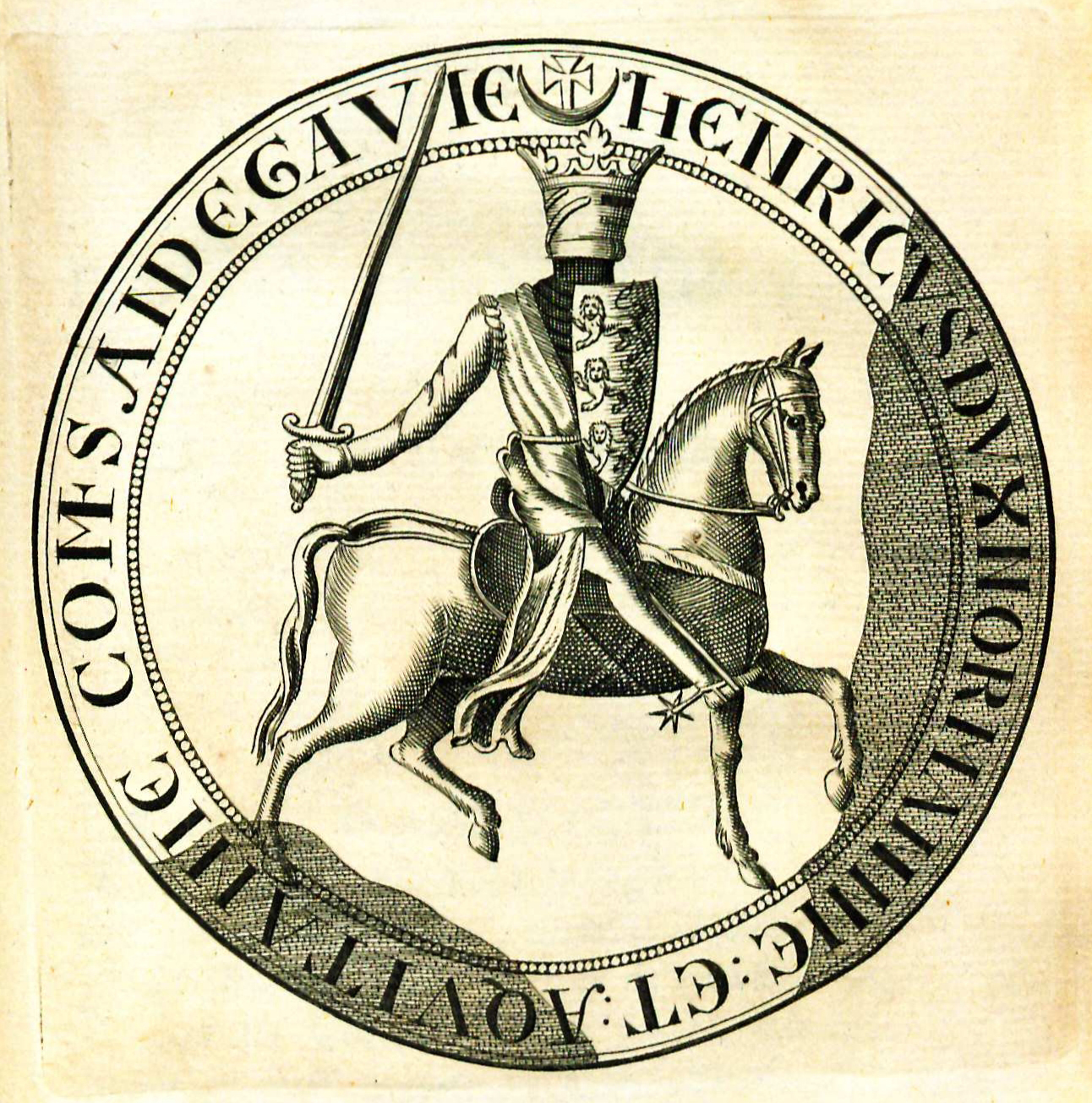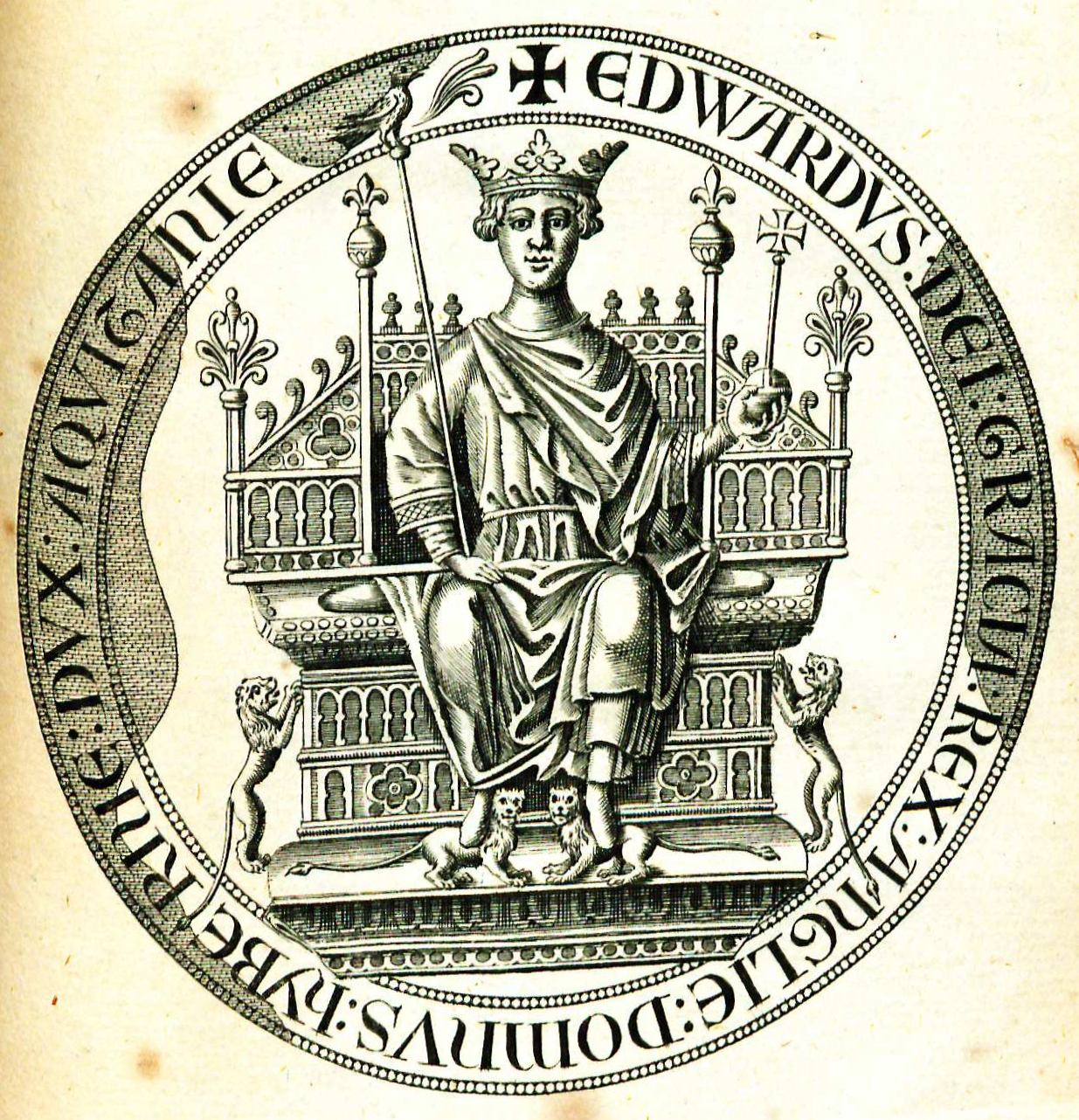Difference between revisions of "Law Tracts"
m |
m |
||
| Line 15: | Line 15: | ||
|set=2 | |set=2 | ||
|desc=[[:Category:Octavos|8vo]] (22 cm.) | |desc=[[:Category:Octavos|8vo]] (22 cm.) | ||
| − | |shelf=F- | + | |shelf=F-2 |
}}[http://en.wikipedia.org/wiki/William_Blackstone Sir William Blackstone], law reporter, judge, and Oxford's first [http://en.wikipedia.org/wiki/Vinerian_Professor_of_English_Law Vinerian Professor of English Law], is perhaps best known as the author of ''[[Commentaries on the Laws of England]]''.<ref>Wilfrid Prest, "[http://www.oxforddnb.com/view/article/2536 Blackstone, Sir William (1723–1780)]" in ''Oxford Dictionary of National Biography'', accessed June 19, 2013.</ref> ''Law Tracts'' predated that publication by three years and compiled for the first time several of Blackstone's earlier works. Texts reprinted in volume one include ''Essay on Collateral Consanguinity'', previously published in 1750, ''Considerations'' (1758), and ''Treatise on the Law of Descents'' (1759). Blackstone's work on the Magna Carta from 1759, ''The Great Charter and Charter of the Forest, with Other Authentic Instruments: to which is Prefixed an Introductory Discourse, Containing the History of the Charters'', comprised the whole of volume two. According to one biographer, "[t]hese self-published reports were almost certainly intended as money-making ventures."<ref>Wilfrid Prest, ''William Blackstone: Law and Letters in the Eighteenth Century'' (Oxford: Oxford University Press, 2008), 214.</ref> | }}[http://en.wikipedia.org/wiki/William_Blackstone Sir William Blackstone], law reporter, judge, and Oxford's first [http://en.wikipedia.org/wiki/Vinerian_Professor_of_English_Law Vinerian Professor of English Law], is perhaps best known as the author of ''[[Commentaries on the Laws of England]]''.<ref>Wilfrid Prest, "[http://www.oxforddnb.com/view/article/2536 Blackstone, Sir William (1723–1780)]" in ''Oxford Dictionary of National Biography'', accessed June 19, 2013.</ref> ''Law Tracts'' predated that publication by three years and compiled for the first time several of Blackstone's earlier works. Texts reprinted in volume one include ''Essay on Collateral Consanguinity'', previously published in 1750, ''Considerations'' (1758), and ''Treatise on the Law of Descents'' (1759). Blackstone's work on the Magna Carta from 1759, ''The Great Charter and Charter of the Forest, with Other Authentic Instruments: to which is Prefixed an Introductory Discourse, Containing the History of the Charters'', comprised the whole of volume two. According to one biographer, "[t]hese self-published reports were almost certainly intended as money-making ventures."<ref>Wilfrid Prest, ''William Blackstone: Law and Letters in the Eighteenth Century'' (Oxford: Oxford University Press, 2008), 214.</ref> | ||
Latest revision as of 10:22, 23 May 2024
by William Blackstone
| Law Tracts in Two Volumes | |
|
Title page from Law Tracts in Two Volumes, volume one, George Wythe Collection, Wolf Law Library, College of William & Mary. | |
| Author | William Blackstone |
| Published | Oxford: Clarendon Press |
| Date | 1762 |
| Edition | First collected |
| Language | English, French and Latin |
| Volumes | 2 volume set |
| Desc. | 8vo (22 cm.) |
| Location | Shelf F-2 |
Sir William Blackstone, law reporter, judge, and Oxford's first Vinerian Professor of English Law, is perhaps best known as the author of Commentaries on the Laws of England.[1] Law Tracts predated that publication by three years and compiled for the first time several of Blackstone's earlier works. Texts reprinted in volume one include Essay on Collateral Consanguinity, previously published in 1750, Considerations (1758), and Treatise on the Law of Descents (1759). Blackstone's work on the Magna Carta from 1759, The Great Charter and Charter of the Forest, with Other Authentic Instruments: to which is Prefixed an Introductory Discourse, Containing the History of the Charters, comprised the whole of volume two. According to one biographer, "[t]hese self-published reports were almost certainly intended as money-making ventures."[2]
Evidence for Inclusion in Wythe's Library
The evidence is not conclusive, although it would not be surprising that Wythe owned this title. The Brown Bibliography[3] lists the first collected edition (1762), noting that the copy in Thomas Jefferson's Library at the Library of Congress has the signature of D. Carr on the title page. Jefferson gave Dabney Carr, his nephew, many of Wythe's law books. This might be one of those titles. It is not listed on the Jefferson Inventory, but the list of books given to Carr begins on a page with a fragment missing from the top.[4] Perhaps Law Tracts was originally part of the list. Jefferson did sell the copy with Carr's signature to Congress, but how Jefferson gained or regained possession of the set is unknown. The Wolf Law Library followed Brown's suggestion and purchased a copy of the first collected edition.
Description of the Wolf Law Library's copy
Two octavo volumes bound in recent hessian cloth with gilt lettering and rules to spines.
Images of the library's copy of this book are available on Flickr. View the record for this book in William & Mary's online catalog.
See also
References
- ↑ Wilfrid Prest, "Blackstone, Sir William (1723–1780)" in Oxford Dictionary of National Biography, accessed June 19, 2013.
- ↑ Wilfrid Prest, William Blackstone: Law and Letters in the Eighteenth Century (Oxford: Oxford University Press, 2008), 214.
- ↑ Bennie Brown, "The Library of George Wythe of Williamsburg and Richmond," (unpublished manuscript, May, 2012) Microsoft Word file. Earlier edition available at: https://digitalarchive.wm.edu/handle/10288/13433.
- ↑ Endrina Tay & Jeremy Dibbell, "Reconstructing a Lost Library: George Wythe's 'Legacie' to President Thomas Jefferson," Common-Place, Tales from the Vault (January 2009).
External Links
Read volume one of this book in Google Books.
Read volume two of this book in Google Books.



